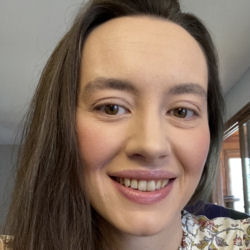
Martha Carvour, MD, PhD
Assistant Professor of Internal Medicine and Epidemiology, University of Iowa Carver College of Medicine and College of Public Health
— MEDICAL SCHOOL —
University of Iowa
— INTERNAL MEDICINE RESIDENCY —
University of Texas Southwestern
What is your current position?
I am an Assistant Professor of Internal Medicine and Epidemiology at the University of Iowa Carver College of Medicine and College of Public Health.
Where did you attend medical school and postgrad training?
I completed my medical and doctor of philosophy degrees at the University of Iowa. After graduation, I completed an internal medicine residency at the University of Texas Southwestern and an infectious diseases fellowship at the University of New Mexico. During my postgraduate training, I participated in the American Board of Internal Medicine research pathway—a training option designed for internists who want to maintain a strong research focus during their postgraduate years and throughout their medical careers.
Why did you choose to become a physician?
My decision to become a physician really hinged on two things. First, I enjoy interacting one-on-one with patients and their families to provide direct clinical care. Second, as a scientist, I also wanted to ensure that I kept the perspectives of patients, families, and health care teams in mind whenever I approached a research topic.
What field of internal medicine did you select and why?
My subspecialty is infectious diseases. This field allows me to stay up to date on many topics in internal medicine, immunology, and microbiology; work with patients, families, and other members of the health care team to address complex clinical challenges; and thoughtfully consider the social determinants or social influencers of health for patients and communities served by our health systems.
Please describe a typical day in your practice.
My favorite thing about my work is that every day is a little bit different. During some weeks of the year, I spend time seeing patients in the hospital. During most weeks of the year, I spend a lot of time interacting with other researchers—including student scholars—to design studies, analyze results, or write papers. Our research team also engages with communities as co-equal partners in our research, so I have many opportunities to work with and learn from community members, too.
What are some of your special interests professionally?
As a physician–scientist, I am focused on advancing health equity for patients with diabetes-related foot conditions, including severe, limb-threatening, or life-threatening infections. For our research team, this means evaluating the scientific methods we use to ensure that these promote structural equity instead of perpetuating or exacerbating structural inequity; ensuring diversity, equity, and inclusion in our own work environments; and advocating for infrastructural improvements in health systems that make these more equitable and just. For research to be as scientifically rigorous as possible, it must also be rigorously equitable.
What are your interests and hobbies outside of medicine?
Hiking, weightlifting, home improvement, and coffee!
What advice would you like to share with medical students, or what do you wish someone would have told you while you were in medical school?
The systems where we study, work, and practice can change—and they will change dramatically over the next 10 years. Your voice, your advocacy, your research, and your empathy can be a part of that change.
Which talent would you most like to have?
Creating new recipes and combining new ingredients like a chef!
If you could change one thing about yourself, what would it be?
To practice more contentment—even as I am working toward new things, to still be truly joyful with things as they are.
What is your most treasured possession?
Time. I have been thinking about this a lot over the past few years and have heard similar reflections from colleagues, patients, and friends. How is our time invested? In whom is it invested?
What is your motto?
There is no substitute for thinking.

